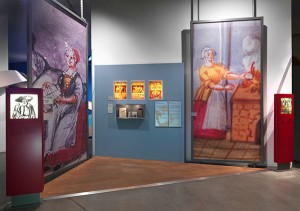Why Lilith Fascinates Our Visitors
One of the tours of the permanent exhibition that I offer regularly is on the subject of women in Judaism. Visitors interested in this topic are usually women’s groups and people already familiar with the essentials of Judaism and Jewish history. I enjoy the lively discussions I have with participants of this tour. When we talk about the life of Glikl of Hameln, Dorothea Schlegel, Albertine Mendelssohn-Bartholdy, and Else Lasker-Schüler, or about Lilith and Eve, we’re also discussing women’s rights – and that means our own rights!
People have heard a wide variety of things about Lilith: “Doesn’t she appear in Goethe’s Faust?” “Lilith is important for fortune telling with cards.” “Adam’s first wife, before Eve.” Some think of Lilith as a threatening ghostly figure, and others named their daughter after her, since she also represents self-determination, independence, unbridled ferocity, and joyous sensuality. Her model of life contrasts with the traditional image of women – in fact, she is Eve’s foil. No wonder that the name Lilith is known above all in feminist circles.
In a showcase in our permanent exhibition, you can see amulets and lucky charms from the time of Glikl of Hameln. The paper with Hebrew prayers written on it, along with the silver pendant, were supposed to protect pregnant women and newborn babies – particularly from Lilith, who, in Jewish tradition, is an evil spirit with the power to kill children. The amulets – taken out of their original context and lying in a brightly-lit museum showcase – lose some of their aura and don’t appear to have any meaning for our lives today. And yet participants of the tour unfailingly understand the fears that are associated with pregnancy and birth.
I also talk about the legendary fight between Adam and Lilith that ended when Lilith left her husband Adam. According to one interpretation, the quarrel flared up over the question of who was on top. Lilith insisted on equality, alleging that she was also created in the image of God. Adam couldn’t accept this. At the latest from this point on, the discussion touches on our lives today, and so I hope you’ll now be able to make religious arguments too, next time the subject of equal rights arises! If not, book a “Women in Judaism” tour!
Karin Grimme, Education
Public tours on “Women in Judaism” will take place in November and December on Sundays at 3 pm.

